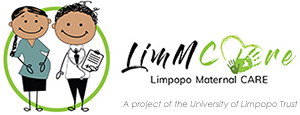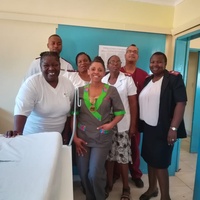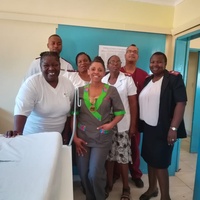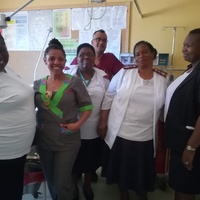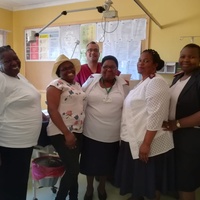The public sector maternity units have gained a reputation for being non-caring and adopting practices that violate the human rights of women during labour and birth. There is a growing movement both globally and nationally to re-instill the basic principles of medical and nursing care that are rooted in respecting the dignity of clients, especially pregnant women. The LimMCARE’s RMC promotes pain relief during labour, Better Birthing Initiative practices and competent birth companions to support mothers during pregnancy, labour, birth and postpartum.
Birth Companionship
There is a plethora of evidence that having a birth companion or Doula during pregnancy and labour significantly improves the birth outcomes for both mother and baby. The Doula concept is new to Limpopo and will require much sensitisation of both health care providers and communities for it to be successfully implemented. It was opted that birth companionship be initiated as a prerequisite to implementing a Doula project. Standards of Practice (SoP) has been developed to guide the integration of Birth Companions into the health care system in Limpopo. Facilities in the LimMCARE pilot site are being mentored and supported to encourage women to use birth companions during labour and birth.
The birth companions are orientated and equipped with birth companion skills as part of the antenatal education programme (birth companions will be required to attend as many antenatal education classes with the mothers). Labour wards are also equipped with basic tools that birth companions can use, and which have proved effective for non-pharmacological pain relief, to support mothers, e.g. birthing balls, heat packs, cold packs, massages, posters, etc.
Antenatal care and education
Antenatal care (ANC), which is the healthcare and support received whilst pregnant to ensure optimal wellbeing for both the mother and unborn baby throughout pregnancy. It is critical that all women are offered the best healthcare by skilled professionals throughout pregnancy. Limpopo is challenged with the over-flooding of high-risk antenatal care clinics with clients that are not high risk. LimMCARE Limpopo has reviewed the Guidelines for Maternity Care in South Africa and has identified criteria for the referral of patients to a doctor so that patients are appropriately referred. This will reduce high risk patients not being assessed by a specialist and also reduce patients with uncomplicated pregnancies being transferred to the high-risk clinic and thus decongest the high-risk clinic. The strategy is being applied in the pilot site and is already yielding positive results.
Pregnant women in the public health sector have limited to no access to pertinent information about pregnancy, labour, birth and postnatal care, which is a key driver of poor maternal and newborn health outcomes. We have developed an antenatal education programme (also referred to as antenatal classes in the public sector), which covers key topics such as what to expect during pregnancy and delivery (including danger signs and what to do); pain relief during labour and post-delivery; breastfeeding; nutrition, baby care and parenting. The programme will be implemented at all primary health care facilities as part of the antenatal care package. A facility-based multidisciplinary team at each facility, comprising of topic/content experts such as nutritionist/dietician, physiotherapist, midwife, obstetrician, community health workers will collectively implement the programme, led by a midwife. Relevant videos/DVDs are being sourced and screened, to reinforce health messages. A package of materials (including flipcharts, manuals and posters) have been developed and printed for every facility that implements the antenatal education programme.
